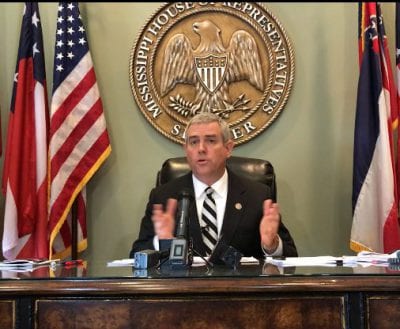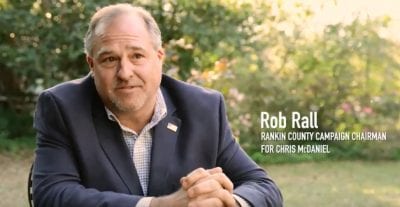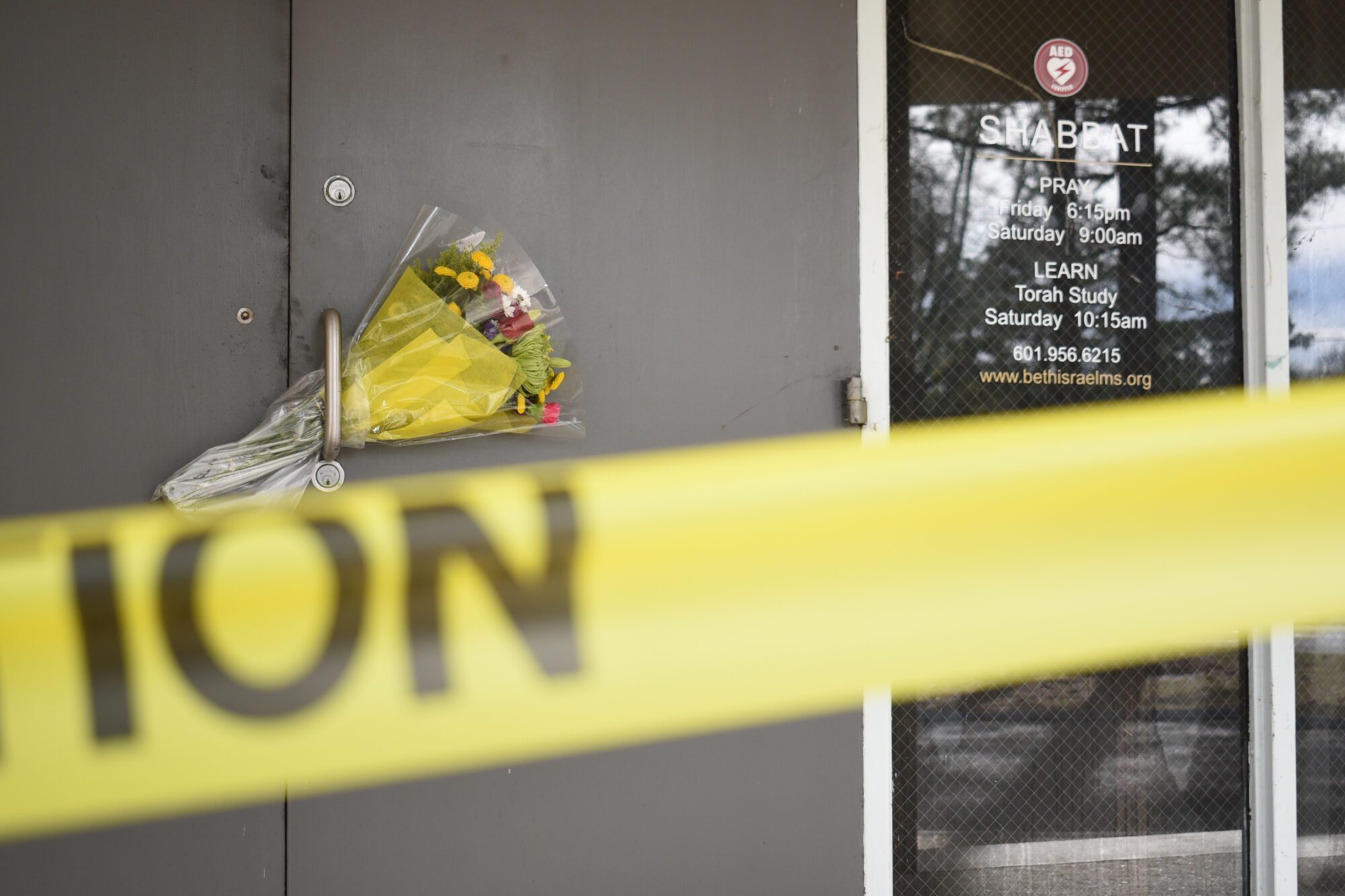
Speaker of the House Philip Gunn
After Sine Die of the 2018 Legislative Session, Speaker of the House Philip Gunn met with media to discuss what he said to be a successful year for the House of Representatives, accomplishing all three of the agenda items they set before themselves.
“Last year, back in December, I mentioned three things that were of importance to us in the House of Representatives,” said Speaker Gunn. “Number one was a rewrite of the education funding formula, number two was to come forward with a road and bridge plan, number three was Medicaid. I will tell you we in the House delivered on all three of those goals.”
The House passed a rewrite of the education funding formula very early on in the session and sent it to the Senate for consideration. He described it as a bill that was worked on between the House and Senate and was encouraged to be a bipartisan measure. Conversations with EdBuild have been going on for over a year statewide with input from lawmakers, school superintendents and administrators. Gunn said it was a well discussed plan and a better way to fund schools by making a real impact in the state’s schools. However, the bill died in the Senate when eight Republicans voted against it.
Not much explanation was given from the Senate when the bill was killed, in somewhat of a surprising manner. At that time Lt. Gov. Tate Reeves did express his disappointment that it was not approved by Senators.
For item number two, addressing Mississippi’s failing infrastructure he said the House brought forward a solid policy with HB 722. The bill would utilize a “Use Tax” that is already coming into the state and taking about a third of that and putting it into the counties to assist with helping with roads.
“Solid public policy, a statement of priority in the House of Representatives that we are serious about roads, and we passed it,” said Speaker Gunn. This bill was also passed in short order. However, when it got to the Senate it was shut down. Shortly after the Senate presented their own piece of legislation, The Bridge Act as the state’s new infrastructure plan.
“Clearly, we hit the ground running on our end we did what we set out to do, both of those measures died on the other end of the building. The Senate passed a proposal for roads and bridges that we did not find would result in real dollars. We did not feel like the Bridge Act would result in real help to cities and counties,” said Speaker Gunn.
Finally, the semester long battle of the Medicaid Tech bill was resolved at the very end of session. Gunn said Senators and Representatives were still in negotiations as late as Monday night and credits his members for holding the appropriations bill, forcing a push on a tech bill agreement.
“I feel good, as far as the overall semester I think the House of Representatives did what we set out to do. We set forth our goals and we accomplished those goals,” said Speaker Gunn.
He said many Representatives told him this was one of the smoothest years of session they had participated in, including a 23 year veteran.
He also gave praise to the House’s passage of HB 1510, a bill authored by Rep. Andy Gipson to make abortions illegal after 15 weeks gestation in the state. He said his office has always believed that life begins at conception and was proud to be apart of a measure to protect that.
The Speaker said he hopes to see resolution come to infrastructure needs and more conversation on the education rewrite during the off season and that he would be open to more discussion and negotiation on both of those topics.
Watch some of Speaker Gunn’s remarks below:
\
Speaker Gunn Press Release Below:
Today, the Mississippi House of Representatives officially voted to “Sine Die,” which marks the end of the 2018 Regular Legislative Session. During the course of the session, we welcomed five new members and left four days early, saving taxpayer dollars.
Fiscal Year 2018 Budget
The final budget number agreed upon by both House and Senate members comes in around $6 billion. The state’s revenues are essentially flat.
The following figures compare to the FY 2018 State Support level of funding and do not include deficits:
- K-12 Education–$2.48 billion total, an approximate $4.1 million increase
- IHL Universities–$669 million total, an approximate $266,000 decrease
- Community and Junior Colleges–$237.5 million total, an approximate $300,000
increase
- Department of Health–$59.3 million total, an approximate $2.3 million increase
- Department of Mental Health–$226.9 million total, an approximate $238,000 increase
- Division of Medicaid–$917 million, an approximate $1.7 million decrease
- Department of Public Safety–$86.8 million, an approximate $2.3 million increase
Of note, in the Department of Public Safety’s budget, the bill increases funds to add more medical examiners and a small trooper school.
Bond negotiations between the House and Senate succeeded this year. In order to raise funds, bonds are often issued. Bonds are often necessary to help fund large projects with the intent to repay the debts over time.
This year’s bond package totals $250 million and will go toward funding various projects with statewide impact: $50 million to the Local System Bridge Repair and Rehabilitation Program (LSBP); $82.5 million for universities; $25 million for community colleges; $45 million for Ingalls; $40 million for the Department of Finance and Administration. The package would further provide money for loan programs for small cities and counties to assist with sewer and water projects.
Additional legislation passed that will reduce the fee in lieu from $100 million to $20 million, allowing counties an additional economic development tool to attract new businesses.
Infrastructure
Maintaining our roads & bridges is a fundamental role of government that House members are passionate about supporting. We have led the charge over the last several years to direct real money to cities and counties to assist with road and infrastructure repair. Early in the session, the House offered the Senate several proposals offering solutions. All House proposals were met with an unwillingness of the Senate to negotiate.
The House adopted a stronger version of the Building Roads, Improving Development and Growing the Economy Act (BRIDGE) passed earlier by the Senate.
“Our plan uses real money, without growth triggers, to address this pressing issue faced over the entire state,” said Speaker of the House Philip Gunn. “As we have said before, our attempt with this legislation was one of the best things we could have done for local government.”
The House bill made strides on the local and state levels for infrastructure improvements. But ultimately, the Senate would not compromise. Their version would not help cities and counties with real money. The House version recommended a use-tax, which is already gathered from sales tax collected on any out-of-state purchases, including those made online. Approximately $310 million was collected last year. The new diversion will divert 35 percent of use tax collections, which is approximately $108 million by today’s estimates, to cities and counties for road and bridge repair.
The Senate insisted on a one-to-one match for new dollars and cities having “skin in the game.” Cities would only get credit for new money. They would have to address true core functions of government through layoffs or the raising of taxes.
“Until we can get a bill that addresses all the needs in the state, we will stand firm,” said Speaker Gunn. “In the eyes of House members, cities and counties already have ‘skin in the game.’ This is your money, and the House has been intent on diverting it back for road and infrastructure needs.”
In addition to the $50 million secured for the LSBP, both chambers adopted legislation that if general fund revenue growth is more than two percent, 50 percent of that growth (up to $100 million annually) will go toward infrastructure improvements: 60 percent will be sent to MDOT for road and bridge repair; 25 percent for county roads and bridges; and 15 percent for city roads and bridges.
Health
In a landmark move, the House passed House bill 1510, the 15-week abortion ban. This bill will provide protections for women and unborn children by prohibiting abortions at or later than 15 weeks gestation. With the passage of HB1510, Mississippi has adopted the strongest pro-life legislation in the country.
Medicaid
Medicaid is a joint state and federal insurance program. The federal government places regulations on the program, which requires states to provide
certain services within their program.
The “Medicaid Tech Bill” is legislation the legislature passed years ago that mandates certain optional services the Division of Medicaid, a part of the executive branch of government, must offer. Every so often, including this year, the tech bill comes up for renewal.
This year, members adopted legislation that mandates the managed care companies, which represent about 70 percent of Medicaid patients, pay the same reimbursement rate as the legislature-set rates for Medicaid. Other changes include reimbursements for treatment of opioid dependency, payment options for small rural hospitals with 50 or fewer licensed beds and the creation of a study committee to determine the effects of a potential five percent reduction in reimbursements in hopes of lowering Medicaid costs.
As the face of healthcare constantly evolves, Medicaid must also keep up with the changes. As a result, members determined that the director of the Division should have some leeway in determining the details of some services that are covered: the number of physician visits, prescriptions drugs, emergency medical transportation services, pharmacy services, dental services.
Education
Education is a priority for the Legislature every year. We devote more than half of our budget to education. The House passed sound legislation early in the Session to adopt a new funding formula for public education in Mississippi. The Mississippi Uniform Per Student Funding Formula Act of 2018 ultimately died on the Senate floor.
“I commend the House members who voted in favor of this solid legislation at the beginning of session,” said Speaker of the House Philip Gunn. “They recognized that our children are a priority. I am very disappointed that the Senate missed the opportunity to provide our school children a better funding mechanism.
“Those senators who did not support the legislation failed to do what is best for the students,” he continued. “They let the politics of public education get in the way of our students. We can argue about the dollar amount all day long, but no one can refute that this was a better way to fund education.”
The current funding formula was written almost two decades ago and has not kept up with the needs of the classroom of the 21st Century. We passed legislation to move toward a student-centered funding formula that would consider the needs of all students. Enactment of this legislation would have created a new formula with the following parameters:
- Base student cost set at $4,800, with additional weights added for specific student needs: special education for the different tiers, English language learners, gifted students, low income and high school.
- Funding based on average daily membership (ADM, enrollment figures would be monitored three times a year), rather than average daily attendance (ADA).
- Methods for consistent, accessible reporting.
The House leadership had three priorities this session: send real money to cities and counties for road and bridge repair; rewrite the education funding formula and reauthorize Medicaid. The House succeeded in passing all these measures.











